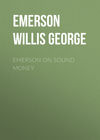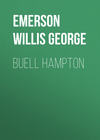Buch lesen: «My "Pardner" and I», Seite 7
CHAPTER XV. – MISS VIRGINIA BONIFIELD
VANCE had become so thoroughly interested during his first visit to Waterville, that he was prepared, in a degree, to share in a general way the enthusiasm of the citizens and the members of the Waterville Town Company which prevailed after the meeting adjourned.
Buoyant with hope of the future, without hardly understanding why, and with a blind belief that his investment would yield him a splendid return, he began to feel that it was indeed a lucky day when the chief of the Banner sent him to the northwest, and still luckier when he fell in with the members of the Waterville Town Company.
That afternoon, accompanied by Homer Winthrop, he called on Miss Virginia Bonifield.
That young lady received her callers with a cultured grace and dignity that would have done honor to even one who had seen much more of the world. She was rather tall and a pronounced brunette. Her well poised head was in keeping with her graceful figure. One could not say she was strikingly beautiful, but there was something in her face as well as manner that made one forget to desire her different than the interesting person she was. Both vivacious and intelligent, she possessed the rare charm, in her conversation, of reflecting the mood of those about her. Addressing Vance, she said:
“Louise has written me so much about you that I have been quite impatient to form your acquaintance. I presume that papa is still working away on Gray Rocks?”
“Yes,” replied Vance, “he will soon reach the 300 foot level.”
"And the old story will be told again, I dare say,” said Virginia, laughing.
“Miss Virginia is not an enthusiast,” said Winthrop, “in regard to untold millions that have not yet been discovered in mining shafts.”
“My observations,” retorted Virginia, “have caused me to be less sentimental, if not more practical, than my good sister Louise.”
“I fear,” said Vance, “you do not share in your father’s belief in regard to the future of Gray Rocks?”
“I am a Bonifield,” replied Virginia, “and believe implicitly in my father; and, in my way, love him as tenderly, I dare say, as any daughter ever loved a parent, but sometimes I fear he is mistaken – but, to change the subject,” she continued, “how do you like the west?”
“I am very favorably impressed with what I have seen. In the east we have many brilliants that are not diamonds; in the west we have many rough ashlars that are diamonds unpolished.”
“Thank you,” replied Virginia, “I consider that a compliment.”
“It is our intention,” said Winthrop, “to claim Mr. Gilder as a western man before another year; and if Waterville continues to grow, as we expect it will, we may persuade him to edit our first daily paper.”
Soon after, they rose to go. “I shall hope,” said Miss Virginia, “that I will be honored by a call from you whenever you are in Waterville.”
“Thank you,” replied Vance, “it will afford me great pleasure.”
Winthrop remained behind a few moments, while Vance walked up and down the sidewalk. The sun was well toward the western horizon. A bluish haze lay against the mountains in the distance. It was an Indian summer afternoon, full of quiet rest, with a gentle, invigorating mountain breeze as a constant tonic.
Presently Winthrop joined him, and they hurried down to the depot, for it was nearing train time, and they had arranged to travel together to Butte City.
“How are you impressed with Miss Bonifield?” asked Winthrop.
“Quite favorably,” replied Vance. “She is, however, an entirely different type from her sister, Miss Louise; indeed, I can discover no family resemblance. Miss Louise is quite fair, while Miss Virginia is a decided brunette.”
Soon after, the train came in, and they secured comfortable seats in a Pullman. As the train started, Vance looked out of the window at the turbulent waters in the river, and asked Winthrop where the foundry, and sash, blind and door factory would be located.
“We have not decided as yet,” replied Winthrop. “That will be an easy matter to arrange when the party or parties are ready to commence building.”
“I presume you are selling a good many lots?” said Vance.
“Well, yes,” replied Winthrop, hesitatingly. “We are interesting a good many people; and it takes people to build a city. Where a man’s possessions are, his heart is generally not far away.”
“I should judge from your complimentary remarks about Miss Virginia Bonifield, and the delightful expression of your face when we called this afternoon, that your heart abides quite permanently at Waterville.” Winthrop seemed confused and looked out of the window. Presently lie said:
“Miss Bonifield is one of the most practical young ladies it has ever been my good fortune to meet. She is a most exemplary young lady, and the good people of Waterville hold her in high esteem. This is her second year in the public school at that place.”
“I judge from her remarks,” said Vance, “that her faith is very limited in her father’s mine.”
“Yes,” replied ‘Winthrop, “I consider her the most practical member of the Bonifield family.”
Vance blushed scarlet and turned resentfully in his seat toward Winthrop. “Ho! ho!” said Winthrop, laughing, “I was merely expressing my own private opinion. I see, without your saying it, that your opinion is quite different. How fortunate it is that all men, especially you and I, Mr. Gilder, are not of the same opinion. This very difference of opinion,” Winthrop went on, “may, as the months come and go, weld our friendship more and more firmly.”
Vance saw that he had betrayed his feelings, and good-naturedly observed that he always was quite partial to blondes. “I presume,” he went on, “when I become editor of the first daily paper in Waterville, you will, doubtless, be president of some great banking house.”
“I hope so,” replied Winthrop, thoughtfully. “If many people are interested in our new town it will help us in more ways than one. They will ultimately move to Waterville, erect homes, and engage in business; but we must not be impatient and expect too much for the first year, or the second, for that matter. ‘Rome was not built in a day.’ I fully believe,” continued Winthrop, “that parties purchasing lots at the present prices will receive most excellent returns on their investments. You see,” continued Winthrop in a confidential way, “the Waterville Town Company was compelled to go into debt very heavily at the time it commenced its operations, but by persistent and continued efforts on the part of various members of the company, we have greatly reduced the indebtedness, and if the sale of lots continues for a week longer we will, probably, not owe a dollar.
We will then divide our property, each member receiving a deed for his respective share.”
Winthrop seemed so happy in anticipation of the joyful time when the company’ would be out of debt, and was so confidential and frank in regard to the matter, that Vance, hardly knowing why, found himself deeply interested in the work of selling lots, and suggested to Winthrop that he would write to some of the members of the Banner force who were particular friends of his, and advise them to send on their surplus earnings for investment.
The town boomer was at once on the alert, and, in not an over-anxious way, heartily advised the step. Accordingly, that night at the hotel in Butte City, Vance wrote a letter to his friends advising an investment in Waterville.
The dramatic critic, the religious editor, the police reporter, and the heads of the several departments of the Banner at once acted on Vance’s advice. They knew nothing of the chief’s action in regard to Vance’s dismissal. They wired Vance, authorizing him to sight draft them for $2,500, and invest the proceeds in town lots in Waterville.
He at once complied with the instructions, turned the money over to Winthrop, and instructed him to forward the deeds to his friends in New York city.
He was not a little gratified to find his last letter to the Banner copied in full by the Intermountain Blade and the Butte City Miner, with editorials referring to the article as particularly able, and to the writer as having the “courage of his convictions.”
The article had a most salutary effect on Homer Winthrop’s lot selling enterprise, and during the next few days he sold more Waterville town lots than his most sanguine expectations had caused him to hope for.
Toward the last of the week Vance left Butte City for Gold Bluff, via Waterville. He had in his possession additional data and statistics to support and corroborate his recent letter to the Banner.
At first the west was distasteful to him, but as he became better acquainted with its customs and habits he began to recognize the true manhood that is not unfrequently found under the miner’s garb.
There is an uncouth, whole-soul generosity met with on the frontier of which the effete easterner knows nothing.
Arriving at Waterville the following morning too late for the Gold Bluff stage, he was compelled to put in another day at Waterville. Remembering Miss Virginia Bonifield’s invitation, he called on her that evening, and was most hospitably received. In the course of their conversation she said:
“I understand, Mr. Gilder, that you are interested with my father in Gray Rocks I hope you did not misunderstand me or my motive when I spoke discouragingly of my father’s mining prospects.”
“May I ask,” said Vance, “what reason you have for your pessimistic views, if I may term them such?”
“I presume,” she replied, a little nettled, “they are about as tangible and equally hard to explain as those of an optimist. I have a presentiment that father will never find what he is looking for in the Gray Rocks mine. My sister, Louise, encourages faith in what to me seems a mad belief.”
“Your sister may be right,” replied Vance.
“My greatest hope,” she replied, “is that I am wrong and that my sweet sister is right; but I really fear, Mr. Gilder, you will never see your money again that you have been investing with my father.”
“I cannot doubt your sincerity,” replied Vance, “but I am glad to have more faith than you have.”
“Why should I have any faith,” she replied. “Have I not seen my father clinging to that false hope year after year, and every day resulting in a fresh disappointment? Long ago I made up my mind that Aunt Sally is about right. She says that father has been planting money with different prospectors all over the mountains, and none of it has ever found its way back. She also predicts that father will work away on Gray Rocks until he dies, and never have his hopes realized. I love my father tenderly, and feel very sorry for him. A stranger cannot understand his personal charms and grandeur as one of his family. He is certainly one of the sweetest characters in the world. His persuasive powers, as you evidently have reason to know, are very great, and I feel it my duty to thus warn you for your own protection. Papa is so sane on everything else excepting Gray Rocks, and is so foolish about that, notwithstanding his many years of lost labor.”
“If your father has a ‘wheel in his head’ on the subject of Gray Rocks, I must admit that I, too, have one in mine,” replied Vance.
The blush that overspread Virginia’s face suggested that she felt keenly the rebuke.
“Pardon me, Mr. Gilder,” said she, “I had forgotten that I am not ‘my brother’s keeper’. I promise never to refer to the subject again.”
That evening, after Vance had taken leave of Miss Virginia Bonifield, he experienced a strange unrest and dissatisfaction, and while he did not admit it to himself, the glamour of his day-dreams had been broken.
Presently, as he walked along, the face of Louise came before him, and, in a moment, he forgot his unsatisfactory evening; forgot hope’s broken glamour, and basked again in the alluring belief that the future held no clouds for him.
It was late when he reached the hotel.
Looking through the window, he saw old Dick Ballard, who was alone in the barroom entertaining himself with an evening drill.
He carried a long, iron poker at “carry arms,” and was marching back and forth with military tread. Arriving at the end of the room, he would call out “Halt! About face! March!”
Vance was very much amused at old Dick Ballard’s pantomime drill, but finally opened the door and walked in. The transformation scene was wonderful. Old Dick Ballard was vigorously poking in the stove, notwithstanding it was a July night.
“Hello, Mr. Gilder,” said he, looking up, “I saw a mighty big rat run in this stove a minute ago, and I am after it.”
“Better charge your entire militia company on the enemy,” said Vance, laughing.
“Oh, you saw me, did you,” said Ballard. “I was jes’ drillin’ up a little for dress parade. Well, pardner, I’ll set ‘em up, and you say nothin’ about it.”
Vance declined to be entertained, but Ballard drank copiously from his ever ready bottle.
“I tell you, Waterville’s got it and no mistake,” said he, putting his bottle carefully away.
“Got what,” asked Vance, as he turned to go to his room.
“Got the crack military company of the state,” replied Ballard. “You ought to see ‘em drill once. There is nothin’ in New York city or anywhere else can tech one side of ‘em for big money.”
CHAPTER XVI. – THE OLD COLONEL’. DISAPPOINTMENT
THE FOLLOWING morning Vance took the stage for Gold Bluff. As he neared that little mining town, he found himself experiencing an impatience once more to see Louise Bonifield that was strangely at variance with any former sensation of his life. It seemed to him the stage coach was traveling at a snail’s pace, and even the good natured, “honest intentioned” Steve Gibbons, with all his droll talk of frontier adventure, failed to interest him. Arriving at the hotel, he found the old miner, Ben Bonifield, waiting for him.
“Am delighted to see yo’, Mr. Gilder; I am indeed, suh. I presume yo’r almost famished; pow’ful tiresome ridin’ in a stage coach all day, suh. After yo’ have refreshed yo’self, I shall be pleased to join yo’ in yo’r room. I have a matteh of vehy great impo’tance to discuss with yo’, suh.”
“All right,” said Vance, in his cheeriest tones. “I trust Miss Louise is well?”
“Quite well, suh; quite well, thank yo’.”
As Vance ate his supper a satisfied feeling of contentment with the whole world intruded itself upon him. His advancement in his profession was certainly gratifying. He had received several valuable hints while in Butte City in regard to a new silver mining company that was about to be organized, in which he was thinking seriously of investing a little money. The price was only ten cents a share, which he had been assured, on what seemed to him very excellent authority, would be worth a dollar a share before twelve months’ time. His investment at Waterville was certainly a good one, and he heartily believed Col. Bonifield had good news to tell him about Gray Rocks. In addition to this, he was once more near Louise, that fair vision of loveliness, whose tender blue eyes seemed ever near him. He dropped a coin into the hand of the waiter as he rose from the table, and stopped in the hallway to caress a lovely little child which he found playing hide-and-seek with an older companion, and then made each a present of money with which to buy bon-bons. He hummed softly to himself the air of an old love song as he went leisurely to his room.
Soon after, he was enjoying a choice Havana with Col. Bonifield sitting in a chair opposite him, smoking his briar-root, blowing blue rings of smoke leisurely toward the ceiling. Vance was animated, and spoke glowingly of the prospects of Waterville. Presently Col. Bonifield said:
“Mr. Gilder, we have reached the 300 foot level, suh,” and then lapsed into silence.
“Have you cross-cut into the vein yet?” asked Vance.
“Mr. Gilder,” said the old miner, as he rose from his chair and walked back and forth in a stately manner, “we have cross-cut, suh, into where the vein ought to have been, but it is not there, suh. I must confess to yo’, suh, that I am greatly disappointed, but the disappointment, I am sure, suh, is only tempoary. Of course it is much richer, suh, than it was at the 200 foot level, but it is not rich enough, suh, to work, by a pow’ful sight.”
This information was a great disappointment to Vance, for he had fully shared the old miner’s belief that they would strike the rich ore at the 300 foot level.
“I will admit, Col. Bonifield, that I am somewhat disappointed, and of course you are. Under the circumstances, what do you advise?”
"Yo’ honor me, suh, indeed yo’ do, Mr. Gilder, to ask my advice, because, suh, I know my advice is good. Whether yo’, Mr. Gilder, will so regard it, remains to be seen. If yo’ can furnish about four thousand dollars mo’ money, I will start to-morrow mornin’ fo’ the 400 foot level, and we will then cross-cut, suh, into a vein of pow’ful rich ore. I assure yo’, suh, I never was mo’ sincere in my life than I am in makin’ this statement, suh.”
Vance possessed the confidence of youth, and his belief in Gray Rocks was not to be shaken at the first disappointment, while before him rose up, as from a mist, the pleading face of Louise, and he fancied she was asking him to still believe in her father.
He took his check book from his pocket and wrote a check for $4,000, and signing it, handed it to the old miner, saying: “How long, with the present force of men, will it take to reach the 400 foot level?”
“My dear Mr. Gilder,” said the colonel, accepting his check, and clasping his hand, “yo’ quite ovehpow’r me, yo’ do indeed, suh. Yo’ may have been bawn in the nawth but yo’ are a Virginian still at heart, with the warm blood cou’sin’through yo’r veins I think, suh, that within three or fou’ mouths we can reach the fou’ hund’ed foot level. I told yo’r father that Gray Rocks was a sure winner, and I am proud, suh, to repeat the statement to you.”
“I don’t know,” said Vance, “whether you will strike it at the four hundred foot level or not, but I assure you, Colonel Bonifield, that I have every faith in your sincerity, and I am anxious to develop the mine as rapidly as possible. If my investment should prove a total loss, I assure you I would never hold you responsible.”
“I am gettin’ along in years, Mr. Gilder,” said the Colonel, “and while I have not struck it yet, I have every confidence, suh, that we will if we stay by Gray Rocks. My little Louise, of cou’se, was disappointed like myself. We both feared, suh, yo’ would be veihy much disappointed; and I assure yo’, suh, we cared a great deal mo’ about yo’r disappointment than we did about our own. To tell yo’ the truth, suh, that little girl of mine had mo’ faith in yo’r looking at this matteh philosophically than I did; but,” continued the Colonel, pressing Vance’s hand, “I misjudged yo’, Mr. Gilder, I did indeed, suh, and I apologize fo’ it.”
After Colonel Bonifield had taken his departure, Vance commenced looking over his accumulated mail. The first thing that claimed his attention was a copy of the Banner containing his article, “Two Honorable Exceptions.” He read it carefully through again with evident pride. Not a word or a single sentence had been cut out. This was gratifying to him, and seemed proof that the managing editor had confidence in his ability to select the wheat from the chaff. He laid down the paper and began opening his letters. Presently the song he was humming died on his lips. He sat upright and stared at a letter which he held in his hand. It read as follows:
Banner Office, New York City.
DEAR SIR: —
I am directed by the managing editor to advise you that your services are no longer required. Enclosed find check in payment of your salary to date.
J Respectfully,
J. M. M.,
Ass’t Managing Editor.
To Vance Gilder, Esq.
He arose from his chair and rapidly paced the room, while great beads of perspiration stood on his forehead. What had he done to merit such humiliation? The idea that it might be a practical joke for a moment found lodgment in his thoughts, but he quickly dismissed the hallucination. Again he took up the paper and re-read the article, “Two Honorable Exceptions.” He endeavored logically to think out a solution of his dismissal.
The more earnestly he thought over the situation, the more distinctly he remembered the prejudiced views the chief seemed to entertain in regard to western enterprises and investments. “He certainly wants the truth,” soliloquized Vance, “and I will stake my life there is not a sentence in this article,” and he struck the paper vigorously with his hand, “but what is true. The article might almost be regarded as an advertisement for the great mining camp of Butte City, yet it was news, and not nearly so strong as it might be and still keep within the bounds of truth. The same is equally true as to what I have said in regard to the agricultural and other resources of Waterville.”
He sat far into the night, discussing with himself this unlooked for calamity. Once, and only once, did the idea occur to him that possibly the chief had sent him into the northwest to systematically destroy confidence concerning western investments. He was too honorable, however, to harbor the thought, and quickly dismissed it as too contemptible to be entertained. The only consolation he could find – and that was certainly a very meager one – was that in all probability a letter of explanation would soon come, that would clear away the misunderstanding. In the meantime he would patiently wait, keeping his own counsel.
He looked over his check book, and found he had, all told, some six thousand dollars to his credit, besides the four thousand dollars he had that evening given to Colonel Bonifield. He sat by his window and considered the advisability of returning at once to New York and demanding an explanation. Such a course would take him away from Gold Bluff, from Gray Rocks, and from Louise.














